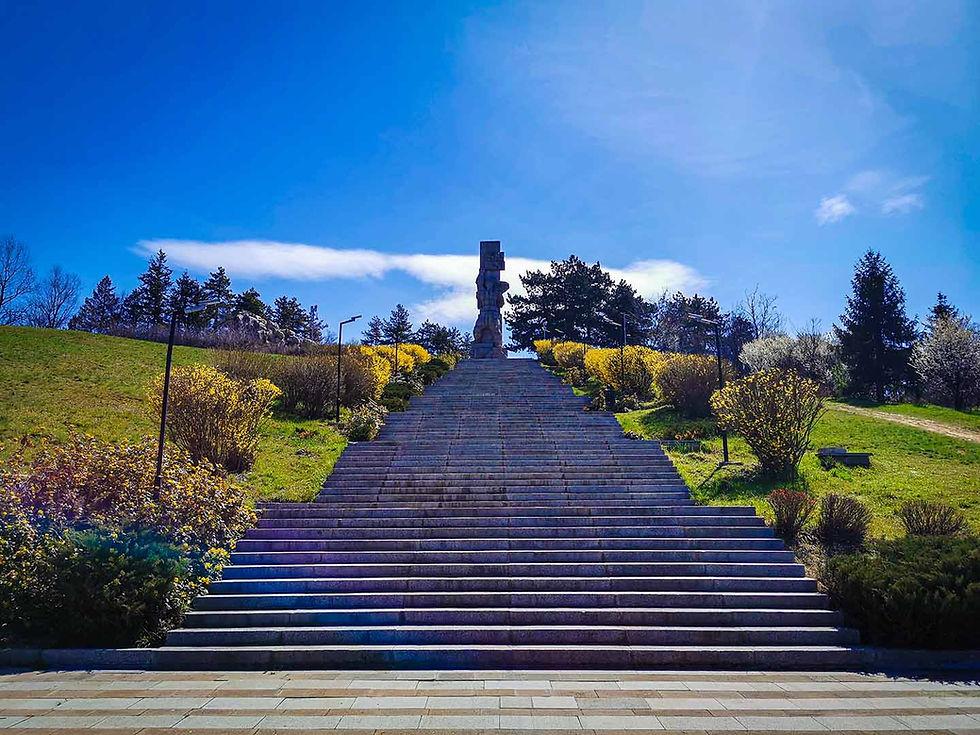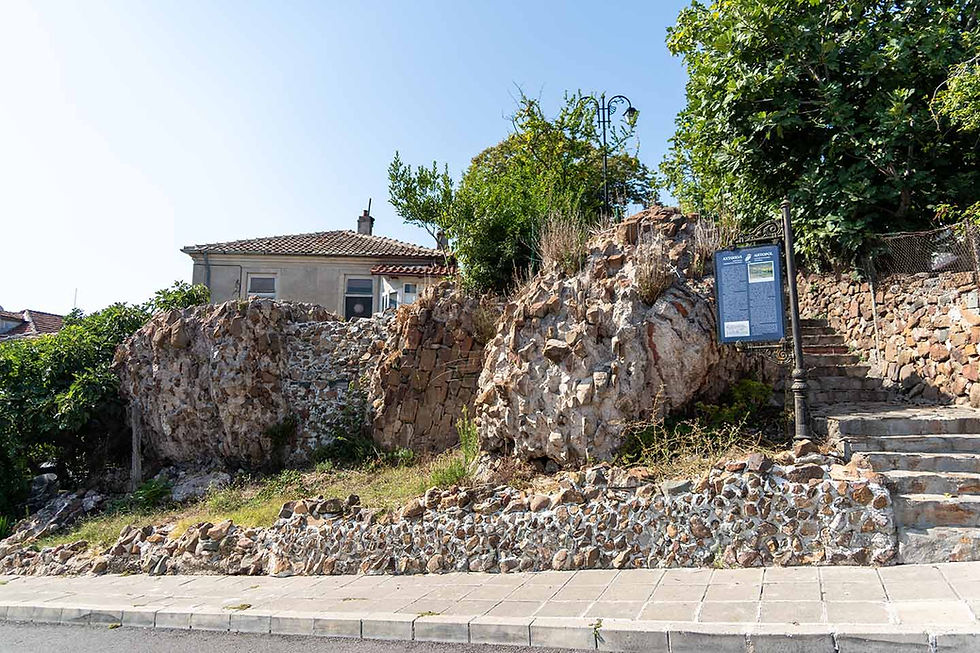Georgi Benkovski
- Stefan Ivanov

- Sep 20, 2022
- 5 min read
Updated: Jan 20, 2025
Benkovski's real (birth) name is Gavril Gruev Hlutev.

Benkovski is a brave young man, a Bulgarian revolutionary, a key figure in the organization and leader of the April Uprising in 1876 in the 4th Plovdiv Revolutionary District.

He was born in Koprivshtitsa on September 21, 1843.

He has two sisters - Kuna and Vasilya.
His childhood was difficult, his father Gruyu Hlutev, a small and respectable merchant, died in 1848, and this forced Gavril to stop his studies after the 3rd grade at the Primary Koprivshtene School, and then his mother let him learn a trade - terziystvo .

Later, unsatisfied with this prospect, he becomes an Abaji apprentice, then separates from his master and takes up trade on his own. It goes around the big markets in Constantinople and south through Anatolia. He is very successful, earns and spends a lot, but he experiences sudden turns that change his thinking and his attitude towards life and the path a person should follow.
According to his own words to Zahariy Stoyanov, one must know how to lie in order to be a successful trader.
For ten years he lived in various places in the Orient - Smyrna, Constantinople, Anatolia, Alexandria, doing all sorts of things.
For a year he was a gavazin to the Persian consul and wore such a fine uniform that people took him for the consul himself.
He spoke seven languages - Bulgarian, Turkish, Greek, Italian, Polish, Romanian and Persian.
Adopting the name Georgi Benkovski, he was actively involved in the actions undertaken by the Bulgarian revolutionary emigration.
Here is what Zahari Stoyanov writes:
The name Georgi Benkovski is not just a coincidence. It belongs to a Polish patriot exiled by the Russian government to the island of Sakhalin. This Pole managed to escape from the hard labor and set foot in Japan. The French ambassador at Edo took him under his protection, for the French have not yet refused to give their patronage to the unfortunate Poles. He gave the Pole a French passport, in which his name was also written - Anton Benkovski, to return with him to Europe. Anton Benkovski chose Turkey as his residence, also a warm patron of his compatriots, and left for Constantinople. His passport openly stated that he was a Polish emigrant. When he arrived in Diyarbekir, he accidentally met Stoyana Zaimova, already known to readers. This last one, also an exile from the Turkish government, had already expressed his intention to escape. Having straightened A. Benkovski's robe, he offered him, if he wished, to give up his French passport, and he should take out a Turkish tesquere. A. Benkovski persuaded and sold Zaimova's passport for 5 lira. With this passport, Zaimov managed to escape to Romania in 1875. When our Benkovski left for Constantinople in the same year to burn him, as I already mentioned above, Zaimov gave him the passport of A. Benkovski, and so our Gavril Hlutev was forced to replace his Bulgarian surname with a Polish one.
In the city of Bucharest, he met Stoyan Zaimov and became passionately passionate about the revolutionary cause. In the summer of 1875, he was included in the group of revolutionaries-arsonists of Constantinople. The purpose of the act was to cause turmoil in the Ottoman Empire. The group arrived in the imperial capital, but did not accomplish what they had planned due to the intervention of Count N. Ignatiev.
Benkovski returned to Bucharest, where he took an active part in the formation and work of the Giurgiu Committee, which met from November 11 to December 25, 1875 and decided on an uprising in Bulgaria in the spring of 1876.
According to the plan of the George Committee, Georgi Benkovski was elected assistant apostle of the 4th Plovdiv revolutionary district with center in Panagyurishte and chief apostle Panayot Volov. Benkovski definitely stands out with his leadership qualities and Volov voluntarily gives up his place as the first apostle.
From April 15 to 17, 1876, he held a meeting in the historical area of Oborishte in order to find out how far the organization of the surrounding settlements, which took part in the preparation of the uprising, had reached.
During the premature announcement of the April Uprising, on April 20, 1876 (old style) in Koprivshtitsa, Benkovski was in Panagyurishte together with most of the other apostles. When he found out that there was already fighting in Koprivshtitsa, he announced the uprising in Panagyurishte as well, after which he quickly formed a detachment and set out to raise the surrounding villages as well.
The word FREEDOM is feminine, so a woman should also carry the flag.
Raina sewed it, she is its craftswoman, so she will fly the flag first.
Georgi Benkovski
Raina Knyaginia took out the main insurgent flag of the 4th revolutionary district and then waved it alongside Benkovski on the first day of the announcement of the insurrection,
The flying squad, with which he traveled tirelessly throughout the region and succeeded in mobilizing and motivating many insurgents, played a central role in the military operations of the insurgency. Even six Croats from Dalmatia and one German who work at the railway station in Belovo are included in the squad. One of them, Stefan the Dalmatian, is their last biracter.
After the brutal suppression of the rebellion in the Panagyur region, Benkovski and the squad head to the Teteven Balkans.

On May 12, 1876 (May 25, new style), after betrayal by grandfather Valyo, he fell into the Kostina River, pierced by a bullet from the gunner Ryuzgyar Hadji Ahmed Agha.

His head was sent to Botevgrad, and then to Sofia.

These events are documented by Zahari Stoyanov in "Notes on the Bulgarian Uprisings". The author himself miraculously survives their organized ambush.
Dear friends, following are links to all my April Epic posts
Oborishte historical area
15 – 17 April summer 1876 and the first Bulgarian National Assembly

Todor Kableshkov

The bloody letter

The Tuteva House in Panagyurishte and announcement of the uprising

Birthplace of Raina Knyaginya

Church "St. Dimitar" in "Verigovo"

Sinjirli well square in Bratsigovo

Klisura

Vasil Petleshkov and fighting Bratsigovo

Church "St. Archangel Michael" - the last refuge in Peruštitsa


I wish you an exceptional and impressive walk!




Comments